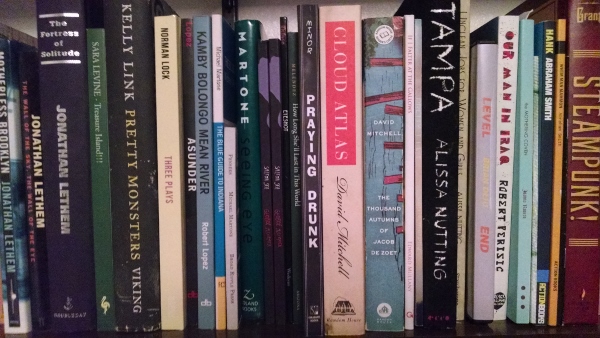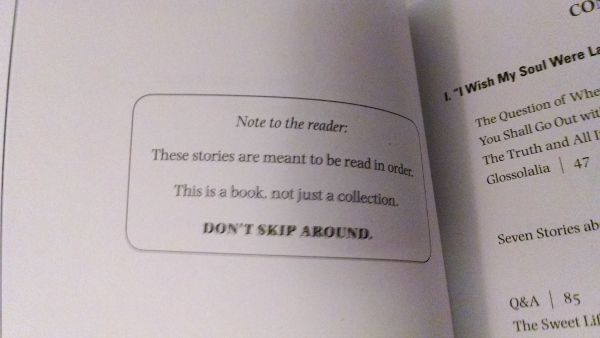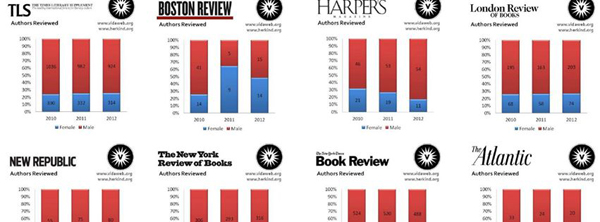I will miss you.
I live in Iowa City, which is a town that is very slightly famous for some of the writers who live, work, and teach there. For the most part, I spend very little time with other writers. Recently I had a book come out. It was my first book. Sometimes I worry that it’s going to be my last. Probably that won’t happen. I’m a worrier. Worrying is what I do.
I think that writing fiction is often just an advanced form of worrying. You worry about a person or a number of people in an imaginary situation. You worry about what would happen to them if they were real, if their situation were real. You worry about how sad they would be, how much they would worry. You worry about dying. You worry them until they die.
(I like to watch crime shows. I love The Wire. I enjoyed The Sopranos a lot more than I thought I would. Currently I’m watching Boardwalk Empire, which is in its last season. Actually this Sunday will be its last episode. The big question people seem to be asking is, “Will the Steve Buscemi character die?” That’s always the question in these shows — at least the ones that are focused on one particular criminal. It was the question with Breaking Bad, too, which was especially funny, because the first thing that really happens in the show is the character discovers he has a terminal case of lung cancer, so, yes, he’s definitely going to die, as will probably all of us. People were upset by the way The Sopranos ended because it didn’t seem to conclusively answer whether Tony Soprano had died or not. Recently, the show’s creator came out and said definitively that Tony had lived. James Gandolfini has been dead for more than a year. (Does a person get more dead over time, or do they die once and then stay the same amount of dead forever?))
But so recently I’ve been spending more time among self-described writers, whom we might also call professional worriers. And I was reminded that most writers choose to express their worries as complaints. For example, they complain bitterly about one-star Amazon reviews. Among these writers, complaining about one-star Amazon reviews (about Amazon in general) is like a handshake. “It arrived a day late,” they’ll say. “One star.” Everyone’s supposed to laugh about this because it’s such a stupid thing to say, because it’s not a review of the product in question (the book) at all. READ MORE >
Some good reasons to submit to a press or magazine are: you like the press or magazine, the publish things you like, they will give you money, they have great covers, they have great designs, they will promote you as a writer, they will make you feel good about yourself, and they will reject your thing if it’s not ready.
Here’s another one I don’t see discussed as often: they will edit your work well and make you look good. (This is rare.) (And here is the most important, never-mentioned advantage: You learn from being edited. My novel’s editor cut a whole bunch of dialogic tags, i.e., “he said”s, from my book. I learned that I was using far too many. Now I’m using fewer. It feels great.)
Let’s talk about what we’ve learned from our editors.
Inventory
I have been persuaded, by the comments of others, and by further reflection, that my initial reaction to the recent fustercluck, (i.e., “fuck this place”), was neither mature nor productive. And worse, some of what I said along the way was hurtful and ungenerous. If I value this space — and I must, because I am still reading, and certainly I did value it once — then I should be the change I want to see.
It has generally been my feeling that the sexism, racism, and general hatefulness of the HTMLGiant community has been consistently overstated, both because of the unfortunate human tendency to confuse the worst of any given group of people with the essence of that group, and because this blog, like any blog, seems to get the most attention when its contributors act out. That being said, I know for a fact that many women and people of color are not comfortable reading these pages. (There are times where I’m not comfortable either.) I don’t like that. I don’t think the vast majority of our contributors, current or past, like it either. So I’m going to try to address the problem head-on in a series of posts designed to make it clear that HTMLGiant is, as a whole, intended to be an inclusive environment. Again, I think that’s where our hearts (mostly) are. If you want to contribute something to this series, I’d be glad to have it, so please email me (at mike(dot)meginnis(at)gmail), because I don’t know what the next post is going to look like.
I’m going to start with myself. I’m going to inventory my privilege, insofar as I can do that. I can’t promise it will be entertaining, but hopefully it will continue the work that others have begun.
An Interview with Gabriel Blackwell
I interviewed Gabriel Blackwell this weekend. We talked about his new book, The Natural Dissolution of Fleeting-Improvised-Men: The Last Letter of H.P. Lovecraft, which is a strange, scary, and above all absorbing novel about the final days of said author of the weird. We talked about our experiences with Lovecraft and Lovecraft fanfiction, Mexican men’s shelters, why we don’t like House of Leaves, and writing “objectively,” among other things. Please watch and enjoy. Then buy his books.
Call for Submissions: “Poetry Sucks!”
I was asked to pass this along, so, here it is! Good luck.
Call For Submissions
The upcoming Third Man Books anthology to be titled Poetry Sucks! An Anthology of Poetry, Music, and All Sorts of Bad Language is accepting submissions.
Third Man Records co-founders Jack White and Ben Swank originally conceived the record label to house, produce, and distribute Jack’s music projects. However, they have always intended to broaden the endeavor’s scope. TMR now features many music artists other than Jack and has taken on new projects such as distributing the legendary Sun and Paramount record labels. Film is another avenue TMR has begun to explore. And not surprising to many, Jack and Ben happen to be language lovers.
You don’t have to write. You don’t need it like the air. You do have a choice. You could stop at any time. In all likelihood, no one would be sorry if you did. It would be fine. It might even make you happier. And isn’t that all for the best? Wouldn’t you rather choose how to spend your only life than have it chosen for you?
The one semester I was lucky enough to teach creative writing, the last project I gave my students was to make the most beautiful thing they could imagine. Practically no one wrote a story or a poem. Someone is giving you the same assignment.
Someone Else is Sexist!
This will come around to David Gilmour if you give it a minute, I promise.
When Paula Deen was revealed as a terrible racist it was sort of funny at first. This rich older lady with her crazy over-styled silver hair and her pancake makeup and her cartoonish fantasy life wherein the height of class and luxury was paying black men to dress like dolls and dance for her gathered friends and family. She was such a perfect grotesque. But then the story wouldn’t die, and on the one hand I don’t like to judge anyone for a prurient interest in anything, but on the other hand I got pretty sick of seeing her face. And more to the point, I got sick of how much other people seemed to enjoy seeing her face. They loved to look at her and hate her.
I’m not saying she didn’t make it easy. She did.
But I think the root of the pleasure we took in Paula Deen’s fall was the pleasure of feeling superior to her. And I will grant you this: the odds are decent that you are not as bad a racist as she is. Probably your racism, like mine, is pervasive and ugly and embarrassing, but probably it is not garish. You have a little class about it. (So do I.) When you have a racist thought, you don’t immediately recognize it as such, but when you do recognize it, you have the good sense to feel really bad. (Me too.) So maybe, in this sense, you and I are better than Paula Deen — perhaps narrowly better, perhaps a lot. It’s hard to say. But what we probably aren’t is uncommonly good people.
I guess the thing is this: why was it so much fun to find out that this particular human being was a bit of a scumbag? Did you have a lot riding on Paula Deen before you found out she was a racist? I am willing to bet you did not. She only became valuable to you, if you are one of the majority who took such pleasure in her collapse, as I will freely admit I initially did, when she became a resource — when she became a fuel. We burned her and felt better for the smell her burning made.
But it’s not as if you didn’t know there were cartoonish, tacky racists out there, right? Please tell me that you knew. If Paula Deen was cause for joy, then you will have cause for joy until the day you are dead: there will be people like her so long as there are people like you and me.
The larger problem, though, is really you and me. Because we keep it quiet. Because no one has caught us yet. Because we’ll get away with it for the rest of our lives.
I have been working up to a question. The question is this: why is my Twitter feed, and why is the Internet in general, so excited to discover they are better people than David Gilmour? Furthermore, by what definition can they reasonably argue this is true? READ MORE >
“It’s time to kill the idea that Amazon is killing independent bookstores.”
This post is rather thin on evidence to claim it’s killing anything, but — while I am mostly agnostic on Amazon’s effects — it is undeniable that Amazon has made reading a much easier habit for many people, and I suspect this leads to more reading in general, not only more reading through Amazon.



